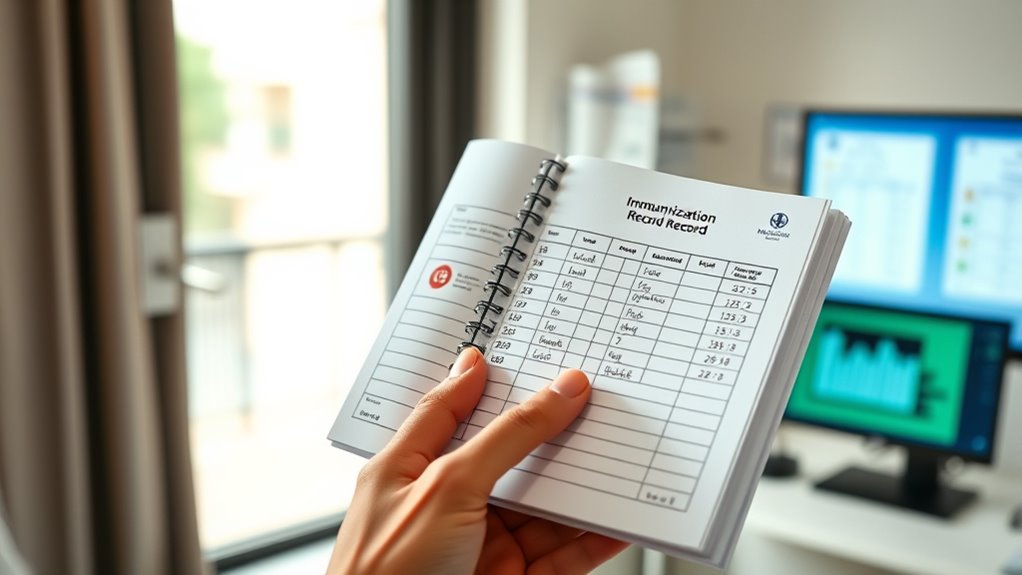To understand and manage your immunization records effectively, keep all documents in one secure location, whether physical or digital. Track key details like dates, vaccine types, and provider info, and use apps or portals to access and set reminders for upcoming doses. Regularly verify and update your records to guarantee accuracy and completeness. Staying organized helps you stay compliant, protected, and prepared to show proof of vaccination when needed—more helpful tips are ahead.
Key Takeaways
- Keep all vaccination documentation organized in a secure location, both physical and digital, for easy access.
- Regularly verify and update records by consulting healthcare providers to ensure accuracy.
- Use digital tools and apps to track, set reminders, and manage immunization schedules efficiently.
- Record essential details such as dates, vaccine types, lot numbers, and provider information for each immunization.
- Carry personal copies of immunization records during medical visits and when traveling to ensure proof of vaccination.

Keeping track of your immunization records is vital for maintaining your health and guaranteeing you meet vaccination requirements. Staying organized helps you avoid unnecessary repeat shots and provides proof of immunization when needed for school, travel, or employment. To do this effectively, understanding vaccine scheduling is key. Vaccine scheduling outlines when each vaccine should be administered based on age, health status, and specific guidelines. Familiarize yourself with these schedules so you can anticipate upcoming vaccinations and plan accordingly. Knowing the recommended timing helps prevent missed doses and guarantees maximum protection against preventable diseases.
Tracking immunization records ensures health, compliance, and protection against preventable diseases.
Record keeping tips can make managing your immunization history much easier. Start by collecting all your vaccination documents in one secure place — whether that’s a physical folder, a dedicated binder, or a digital file. Make copies of your immunization records and store them separately in case the originals are lost or damaged. Keep track of the dates, vaccine types, lot numbers, and healthcare provider information for each shot. This level of detail can be invaluable when verifying your immunization status or resolving discrepancies.
Using digital tools can notably simplify record keeping. Many healthcare providers offer online portals where you can access your immunization history. Additionally, there are apps designed specifically for vaccine tracking, which allow you to set reminders for upcoming doses and store all relevant information in one place. Setting up alerts aligned with vaccine scheduling ensures you don’t forget appointments and stay current with your shots.
Always verify the accuracy of your records. If you notice missing information or discrepancies, contact your healthcare provider to update or correct your immunization history. Regularly reviewing your records helps you stay aware of your vaccination status and prepares you for future appointments. When visiting new clinics or providers, carry a personal copy of your immunization records to facilitate quick verification.
Lastly, consider maintaining a vaccination log, whether digital or paper-based, that tracks your immunizations over time. This log acts as a quick reference and can be particularly useful during emergencies or when traveling abroad. Being aware of the importance of comprehensive record keeping can significantly improve your ability to stay protected and informed about your vaccination history. Remember, keeping your immunization records organized and up-to-date isn’t just about convenience — it’s an essential step in safeguarding your health and guaranteeing you’re protected against preventable diseases. By understanding vaccine scheduling and implementing effective record keeping tips, you’ll stay in control of your immunization history and enjoy peace of mind knowing your health information is well-managed.
Frequently Asked Questions
How Often Should Immunization Records Be Updated?
You should update your immunization records regularly, ideally after every healthcare visit or vaccination. The record update frequency depends on your immunization schedule, which varies by age and health status. Staying current ensures your records reflect your latest immunizations, helping you follow recommended schedules. Keep track of any new vaccines or boosters to avoid missed doses and maintain best protection against preventable diseases.
Can Immunization Records Be Transferred Between Countries?
Yes, immunization records can be transferred between countries, but it depends on international standards and record portability. You should check with both your current and destination country’s health authorities to confirm the records meet their requirements. Some countries accept digital records or international vaccination cards, making transfer easier. Always keep copies and verify that your immunization documentation aligns with international standards for seamless record transfer.
What to Do if Immunization Records Are Lost?
If your immunization records are lost, don’t panic. You can start record recovery by contacting your healthcare provider, pharmacy, or previous clinics where you received vaccines. They may have your immunization history on file. Additionally, ask your current doctor or local health department for guidance. Providing any available personal details, like dates or locations of vaccinations, can help locate or reconstruct your lost documentation efficiently.
Are Digital Immunization Records as Valid as Paper Copies?
Think of digital immunization records as modern scrolls—convenient but requiring trust. They’re generally as valid as paper copies if issued by authorized providers, but digital privacy concerns can impact record accessibility and security. Always verify that your digital records are stored securely and accepted by relevant health authorities. Keep both digital and paper copies if possible, ensuring you’re covered in any scenario where access or validation might be questioned.
How Can I Verify the Accuracy of My Immunization Records?
To verify the accuracy of your immunization records, start by reviewing the details carefully for any discrepancies or missing information. Contact your healthcare provider or immunization clinic to confirm the record’s accuracy and request an official copy if needed. You can also cross-check with your state’s immunization registry or digital health records. Record verification guarantees your immunization history is correct, which is essential for proper health management and compliance.
Conclusion
By keeping your immunization records well-organized, you guarantee smooth sailing through life’s important moments. Think of your records as a gentle guiding hand, quietly supporting your health journey. When you stay on top of updates, you’re gently safeguarding your future and those around you. Remember, a little attention now goes a long way in avoiding unnecessary hurdles later. Embrace the habit of managing your records—they’re a quiet but powerful ally in maintaining your well-being.









